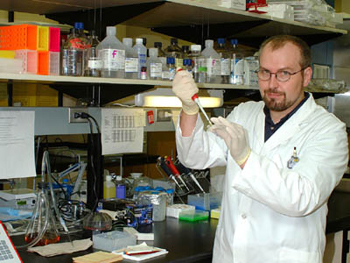 UNMC researcher Kay-Uwe Wagner, Ph.D., answers questions about his work, life and interests.
UNMC researcher Kay-Uwe Wagner, Ph.D., answers questions about his work, life and interests.
NOTE: This profile is part of a series highlighting the 25 researchers who were named UNMC Distinguished Scientists for 2006. Each of these researchers will be profiled in UNMC Today leading up to a March 12 ceremony to recognize their achievements.
- Name: Kay-Uwe Wagner, Ph.D.
- Title: Associate professor at the Eppley Institute
- Joined UNMC: 2000
- Hometown: Eisenach, Germany
Describe your research in 25 words or less.
My laboratory studies the biological function of genes that play a role in the development of the mammary gland and in breast cancer.
How did you decide to pursue this area of research?
I decided to peruse this area of research after receiving my Ph.D. at the University of Halle-Wittenberg in Germany. After finishing my graduate studies, I wanted to acquire new skills and work in an entirely different area. I therefore decided to become a visiting fellow at the National Institutes of Health in Bethesda, Md.
When did you realize you were interested in research?
I developed an interest in research, in particular biology, while I was a high school student. The high school I attended in Eisenach was science-oriented. It was named after one of its former students, Ernst Abbe, who later became the co-founder of the optics company Carl Zeiss Jena.
What are the greatest challenges in research today?
In recent years, it has become increasingly difficult to maintain a funded and efficient research program. Globally, it becomes more and more difficult to identify important new research findings due to an increasing amount of research articles.
Best advice for new researchers?
While seeking financial support for your newly established laboratory, keep publishing your research findings every year. Publications certify the progress that you made in the lab. As the German poet Johann Wolfgang von Goethe once wrote in Faust: “Was Du schwarz auf weiß besitzt, kannst Du getrost nach Hause tragen (What we possess in black and white, we can in peace and comfort bear away).”
When an experiment stalls, what drives you to continue on?
In my laboratory, we work on several projects simultaneously. Exciting new observations that we obtain from one project, to some extent, neutralize a stalled experiment for which we have to go the extra mile to solve the problem.
Who has been your greatest teacher?
Probably life itself and the experiences gathered over time.
Tell us about your family and hobbies outside the lab.
My wife Ulrike and I have been married for 18 years, and we have two daughters, Matilda and Charlotte. Whenever I have time, I play guitar in a garage band in our neighborhood.
Globally, describe the most notable research achievement ever?
All inventions that led to harnessing the power of electricity. Electrical energy gives us light and warmth and it powers almost everything around us. We would not live in such a technologically advanced society today without electricity. In medicine, the most notable research achievement is the identification of antibiotics. Originally, the discovery of penicillin was certainly not a result of hypothesis-driven research. I keep wondering whether Alexander Fleming would have received an NIH grant today for simply observing that mold can kill a set of bacteria on plates that he kept unattended for some time.
Clarify a common misconception about research?
Research is a passion and a business. It is conducted and peer-reviewed by human beings, and therefore, it is often not what you know, but who you know, that matters in getting recognition for your work.
What would you tell a student interested in a research career?
There are easier ways to earn money.
List three things few people know about you.
- My wife and I grew up in East Germany.
- My wife, children and I are now U.S. citizens.
- If I had the chance, I would like to shake hands and thank Mikhail Gorbachev for initiating and approving social reforms that ultimately led to (mostly) peaceful changes in Eastern Europe and the German Reunification (I would not be in the United States today if that hadn’t happened), and Sir George Martin for producing some of the best music ever made and “preserving” the sound of The Beatles on tape at Abbey Road Studios.